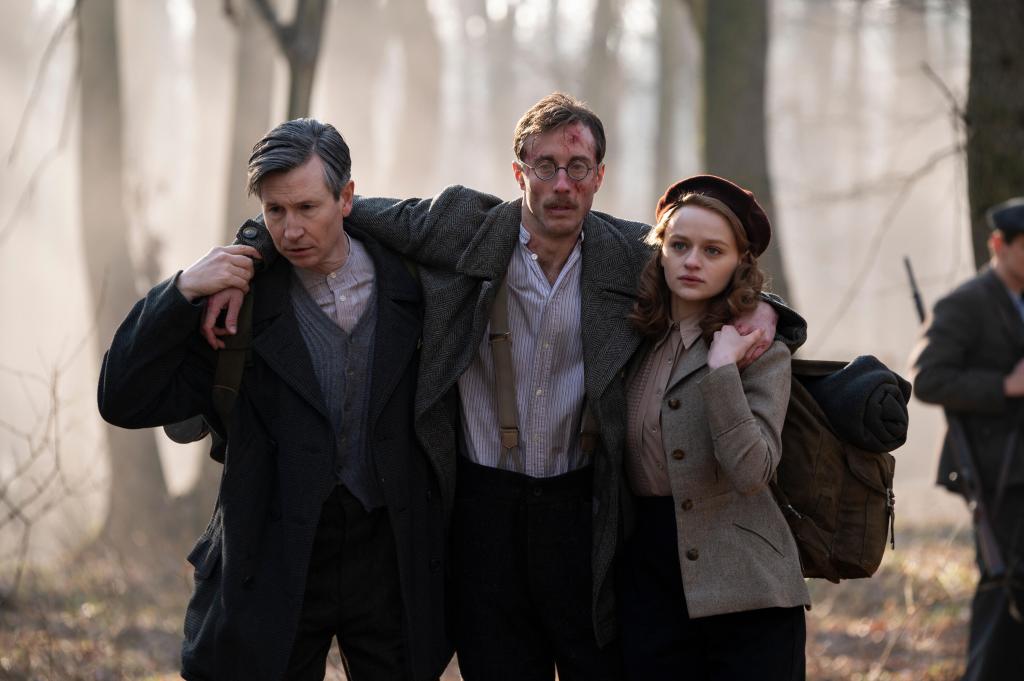[The following contains spoilers from the finale of We Were The Lucky Ones.]
As the first minutes of Hulu‘s We Were The Lucky Ones‘ finale begin, things seem dire for the Kurc family: Halina (Joey King) is facing interrogation upon being arrested by German police, Mila (Hadas Yaron) is struggling to reconnect with her daughter (Belle Swarc) after being forced to hide her in a monastery, and Addy (Logan Lerman) — stuck in Brazil — still can’t know whether his entire family is alive or dead. Spread out across multiple continents and featuring nearly a dozen main characters, showrunner Erica Lipez knew that finding her ending was a tall order.
“That episode was one of the biggest challenges I’ve ever had as a writer,” showrunner Erica Lipez tells The Hollywood Reporter. “We were deep into filming and I was writing [the finale], while we were seeing what these actors were doing. I was just like: I have to deliver this for everybody.”
The concluding episode of Lipez’s miniseries depicts mostly the time that comes immediately after the end of WWII, as various members of the Kurc family — a Polish Jewish family who, over the course of the show, have been strewn across the world in pursuit of survival — seek to find each other again.
The episode swings wildly across the emotional spectrum, with the opening scene depicting a brutal, blood-laden torture and the conclusion finishing with the family reunited for Passover, handing food to each other from across a warmly lit dining table.
“The fact that they all survived, and the fact that, over the course of this episode, they find each other — those are some of the most joyful things I’ve ever gotten to write,” Lipez says. “But also embedded within that is the very real pain of surviving something like that. It comes at a cost.”
Though the tenacity and survival of the Kurcs may at times seem surreal, We Were The Lucky Ones is based on the Georgia Hunter novel inspired by her real family. Lipez says the source material helped ground the extremities of the characters’ experiences.
A bonus, she adds, is “having an incredible writers room. Writing is a team sport,” she says. “I made sure we hired the right writers.”
The dichotomy of hope and despair that the series captures is perhaps most prevalent about 15 minutes into into the finale, when the cast of characters, many still isolated and unable to contact their loved ones, hear over their radios that the war is over. Within seconds, streets flood with celebration and King’s Halina says rather somberly: “We look for everybody. Tomorrow I will go to the Red Cross and double check that all our names are registered.”
“We’re so used to seeing celebratory moments from when that happened,” Lipez says of the war’s official end. “We’ve all seen the iconic photographs, we’ve heard the cheers. But for people who had lost people and were still missing people, it just seemed logical that there wouldn’t be that kind of celebration for them.”
Instead, she says, it was “the start of a new kind of war.”
This brute persistence has guided the show from the beginning. “We talked so much in our writers room, and with the cast and directors, about resistance, and all the forms it takes,” says Lipez. Some of the Kurcs consider fighting in the traditional military sense, others forge documents to hide their identities, and more still seek refuge on train rides to Palestine or boats headed for South America.
“I was just so in awe,” Lipez says, noting the characters’ “daily acts of just living, advancing their lives, of finding ways to connect with people, to love their families, to fall in love, to have kids, to just advance themselves as humans.”
This approach — depicting the monotony of survival — is both what sets We Were The Luck Ones apart from other Holocaust dramas, and also what made it so hard to get made. “I knew it was a once-in-a-lifetime story,” Lipez says, but adds she was aware the ensemble storytelling wasn’t “going to be a particularly appealing proposition to networks.”
In the end, it took her two years to find a home at Hulu, a result she thinks was in part affected by the world’s collective experiences during the pandemic.
“This was a show about a family separated. You watch them spend years just fighting to stay alive, to get back around the dinner table,” she says. “As different of an event as [the pandemic] was [to the Holocaust] of course, I think there was something about that separation. We all understood on such a visceral level, that sort of ache for loved ones. It resonated in a new way.”
With the eighth and final episode now out in the world, Lipez hopes to see the show’s legacy go on to speak for itself.
“I think we are all experiencing the pain of the world right now,” she says. “There’s a lot of pain feeling the timeliness of a project particularly like ours. But I so believe in this family speaking for themselves and the project speaking for itself. It’s a really human story, and I’m hoping that people are connecting to it, and that no matter what perspective they’re coming from, that they see the humanity of this family.”
All eight episodes of We Were The Lucky Ones are available on Hulu.
>>> Read full article>>>
Copyright for syndicated content belongs to the linked Source : HollywoodReporter – https://www.hollywoodreporter.com/tv/tv-features/we-were-the-lucky-ones-finale-explained-1235886355/
